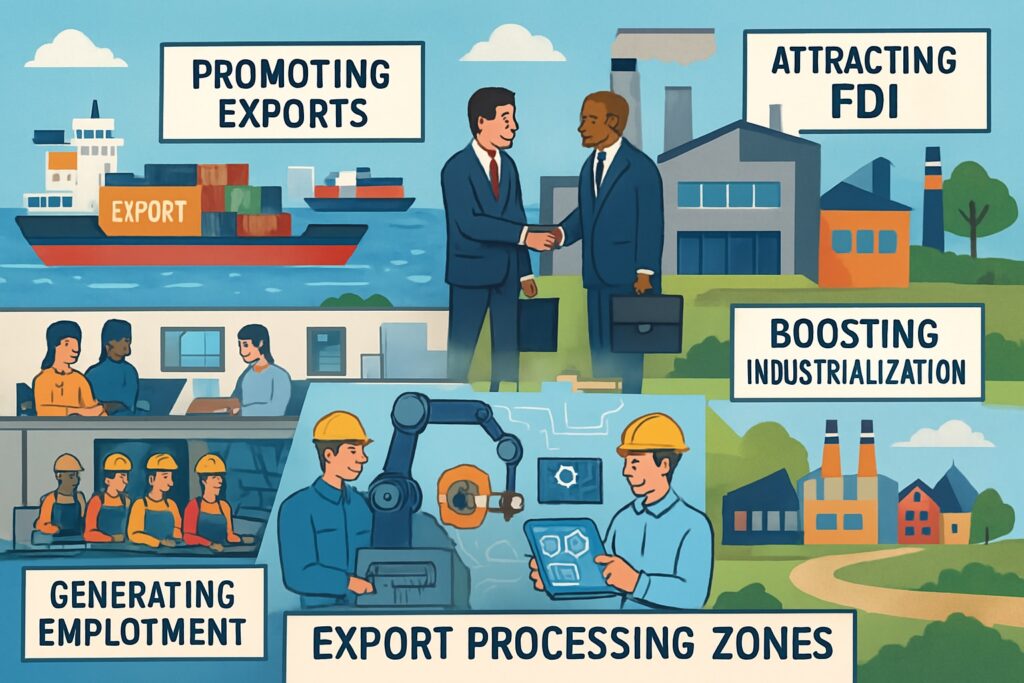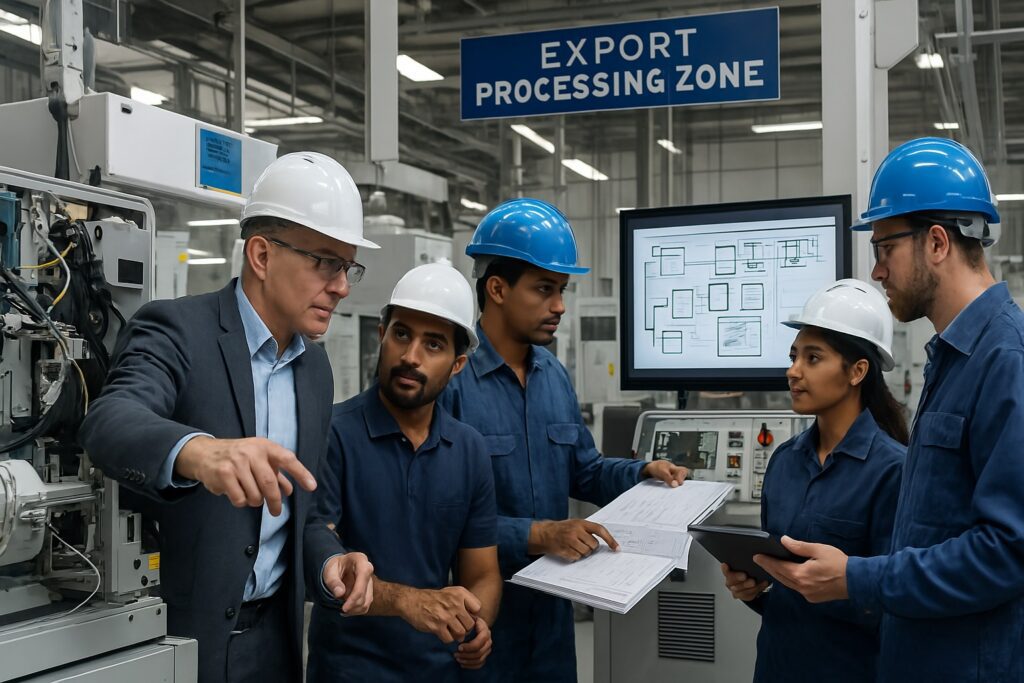Export Processing Zones (EPZs) are specially designated areas within a country that offer favorable conditions for manufacturing and exporting goods. These zones are developed to promote export-oriented industries, attract foreign investment, boost employment, and increase the country’s foreign exchange earnings.

Table of Contents
What are EPZs?
Export Processing Zones (EPZs) are specially designated areas within a country where goods can be manufactured, processed, and exported with minimal regulatory hurdles and attractive incentives. The main goal? To boost exports, attract foreign investment, and generate employment.
In India, EPZs were the forerunners of what we now call Special Economic Zones (SEZs). The very first EPZ in Asia was established in Kandla, Gujarat, in 1965.
Objectives of EPZ
Promote Exports
Export Processing Zones (EPZs) are specifically designed to encourage industries to produce goods and services that are sold to international markets rather than domestic ones.
- EPZs offer a specialized environment where companies can manufacture goods solely for export purposes. This focus helps a country earn valuable foreign exchange.
- To promote exports, governments often provide: Tax exemptions (e.g., on customs duty, income tax), Simplified export procedures, Easy access to ports and logistics
- Goods produced in EPZs are made to meet global standards, enhancing the competitiveness of the country’s products in the world market.
- By producing for export, companies in EPZs get integrated into global supply chains, making the domestic economy more connected to international trade.
Example: A textile factory in an EPZ in India manufactures garments for European brands. These products are directly exported, helping increase the country’s overall export volume.
Attract Foreign Direct Investment (FDI)
- EPZs are developed to create a business-friendly environment that draws investment from foreign companies into the country.
- EPZs provide world-class infrastructure, simplified regulations, and various financial incentives to appeal to international investors. These zones reduce bureaucratic hurdles, allowing foreign companies to establish operations more easily.
- To attract FDI, governments offer: 100% foreign ownership, tax holidays, repatriation of profits, and streamlined customs and labor laws. These benefits reduce investment risks and increase profitability for foreign firms.
- By attracting FDI, EPZs bring in capital, create jobs, and connect the domestic economy with global business networks.
For example, an electronics company from South Korea might invest in an Indian EPZ to manufacture semiconductors for global markets, bringing in advanced machinery and skilled employment.
Generate Employment
- Generate Employment refers to the goal of creating a large number of jobs, particularly in labor-intensive sectors, through the development of EPZs.
- Since EPZs often focus on industries like textiles, electronics, and assembly manufacturing, they require a sizable workforce. This makes EPZs an important tool for reducing unemployment and underemployment, especially in developing regions.
- Employment in EPZs is generated at various levels—skilled, semi-skilled, and unskilled—creating opportunities for a wide range of the population.
- EPZs also help in improving worker skills through on-the-job training, contributing to a better-prepared labour force in the country.
For instance, a garment manufacturing unit in an EPZ may hire hundreds of workers from surrounding rural areas, helping uplift local communities by providing stable income.
Boost Industrialization
- Governments strategically locate EPZs in less industrialized areas to stimulate development, build infrastructure, and attract both domestic and foreign companies.
- This industrialization leads to the creation of support services, better roads, power facilities, and communication networks, which benefit the broader economy.
- EPZs often serve as growth hubs, encouraging the development of new industries, supplier networks, and technology clusters.
For instance, setting up an EPZ in a remote part of a state can lead to the establishment of factories, logistics firms, and housing colonies, transforming the region into an industrial township over time.
Technology Transfer
- When multinational firms set up units in EPZs, they often introduce the latest equipment, systems, and management practices. This can benefit domestic firms through partnerships, competition, or the movement of skilled employees.
- EPZs promote learning and innovation by exposing local workers and firms to international standards, quality controls, and efficient business practices.
- Additionally, knowledge-sharing often occurs when local suppliers, technicians, and engineers interact with foreign firms operating in the EPZs.

For example, a Japanese automotive company operating in an Indian EPZ may train Indian engineers in lean manufacturing practices, which later spread to other domestic industries.
Key Features of EPZs
-
Tax Incentives: Companies often enjoy tax holidays or reduced tax rates.
-
Simplified Regulations: Relaxed labor laws, reduced bureaucratic hurdles, and streamlined customs procedures.
-
Infrastructure Support: Well-developed roads, power supply, telecommunication, and warehousing facilities.
-
Duty-Free Imports: Companies can import raw materials and machinery duty-free for use in export production.
-
Single-Window Clearance: Faster approvals through centralized administrative setups.
EPZs in India
In India, EPZs were among the first initiatives to promote exports. The first EPZ in Asia was set up in Kandla, Gujarat in 1965. Over time, India moved toward a more comprehensive Special Economic Zones (SEZ) model, which includes the features of EPZs but offers broader benefits.
Some prominent EPZs in India:
-
Kandla EPZ (Gujarat)
-
SEEPZ (Santa Cruz Electronics Export Processing Zone, Mumbai)
-
Noida EPZ (Uttar Pradesh)
-
Chennai EPZ (Tamil Nadu)
These zones have contributed significantly to India’s export earnings and industrial development.
Challenges Faced
-
Risk of exploitation of labor due to relaxed labor laws
-
Environmental degradation from unregulated industrial activity
-
Limited integration with the local economy
-
Dependence on global demand patterns
In conclusion, EPZs can be a significant tool for countries looking to increase their exports and attract foreign investment. By providing a conducive environment for businesses to operate and incentives that reduce costs, EPZs can create job opportunities, increase exports, and bring in foreign currency. The success of EPZs, however, depends on various factors, including the regulatory framework, infrastructure, and treatment of workers. With the right approach, EPZs can become an essential driver of economic growth for countries seeking to expand their exports and attract foreign investment.
Read: Geography Notes